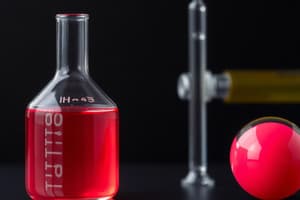Podcast
Questions and Answers
What is the primary reason that all molecules of solute will dissolve in a solvent?
What is the primary reason that all molecules of solute will dissolve in a solvent?
- Because solute and solvent cannot exist separately.
- Because they occupy the same space.
- Because solute molecules are lighter than solvent molecules.
- Because solvent molecules attract solute molecules. (correct)
Which statement best explains why dissolution occurs?
Which statement best explains why dissolution occurs?
- Interactions between solute and solvent molecules promote mixing. (correct)
- The particles of the solute are larger than the solvent.
- All solutes will dissolve regardless of their properties.
- Temperature has no effect on the dissolution process.
What does the spontaneous formation of crystals indicate about entropy?
What does the spontaneous formation of crystals indicate about entropy?
- Entropy increases as a result. (correct)
- Entropy decreases during the process.
- Entropy remains constant throughout.
- Entropy is irrelevant in this context.
What role do solvent molecules play in the dissolution of solute?
What role do solvent molecules play in the dissolution of solute?
Why is spontaneous crystallization considered a clue for an increase in entropy?
Why is spontaneous crystallization considered a clue for an increase in entropy?
What does the term 'reaction rate' refer to?
What does the term 'reaction rate' refer to?
Which of the following best describes a spontaneous process in relation to entropy?
Which of the following best describes a spontaneous process in relation to entropy?
What can be concluded about the dissolution process?
What can be concluded about the dissolution process?
What must be true for a spontaneous process to occur, as indicated by the formation of crystals?
What must be true for a spontaneous process to occur, as indicated by the formation of crystals?
If a reaction has a low reaction rate, which of the following can be inferred?
If a reaction has a low reaction rate, which of the following can be inferred?
Which of the following factors is NOT crucial for the dissolution of a solute in a solvent?
Which of the following factors is NOT crucial for the dissolution of a solute in a solvent?
Which of the following is a characteristic of a fast reaction?
Which of the following is a characteristic of a fast reaction?
Which of the following is a direct consequence of the spontaneous formation of crystals?
Which of the following is a direct consequence of the spontaneous formation of crystals?
How can the reaction rate be measured?
How can the reaction rate be measured?
What happens during a chemical reaction with regard to reactants and products?
What happens during a chemical reaction with regard to reactants and products?
What is a key characteristic of a catalyst in a chemical reaction?
What is a key characteristic of a catalyst in a chemical reaction?
Which of the following statements correctly describes a catalyst?
Which of the following statements correctly describes a catalyst?
How does a catalyst differ from a chemical reactant?
How does a catalyst differ from a chemical reactant?
Which of the following statements is true regarding catalysts?
Which of the following statements is true regarding catalysts?
In the context of the provided reactions, what can be inferred about the reaction with an activation energy less than that of the endothermic reaction?
In the context of the provided reactions, what can be inferred about the reaction with an activation energy less than that of the endothermic reaction?
Which statement is true if entropy decreases in a reaction?
Which statement is true if entropy decreases in a reaction?
What does a higher activation energy typically indicate about a chemical reaction?
What does a higher activation energy typically indicate about a chemical reaction?
What is the role of a catalyst in a chemical reaction?
What is the role of a catalyst in a chemical reaction?
If a second reaction has ΔE = -10 kJ/mole, how is this reaction classified?
If a second reaction has ΔE = -10 kJ/mole, how is this reaction classified?
What is the nature of the reaction where ΔE (net energy) is calculated as $E_2 - E_1$ resulting in +10 kJ/mole?
What is the nature of the reaction where ΔE (net energy) is calculated as $E_2 - E_1$ resulting in +10 kJ/mole?
Flashcards are hidden until you start studying
Study Notes
Reaction Rate
- The reaction rate is a measure of how fast a chemical reaction proceeds.
- The reaction rate can be determined by measuring how quickly the concentration of reactants decreases or how quickly the concentration of products increases.
Entropy
- Entropy is a measure of the disorder or randomness of a system.
- A spontaneous process, such as the formation of crystals, results in an increase in entropy.
Catalysts
- A catalyst is a substance that speeds up the rate of a chemical reaction but is not consumed in the reaction.
- Catalysts work by providing an alternative pathway for a reaction with a lower activation energy.
Types of Reactions
- An endothermic reaction requires energy in the form of heat to proceed, and the net energy change is positive.
- An exothermic reaction releases energy in the form of heat, and the net energy change is negative.
Activation Energy
- Activation energy is the minimum amount of energy required for a chemical reaction to occur.
- The difference between the energy of the reactants and the energy of the transition state is the activation energy.
Studying That Suits You
Use AI to generate personalized quizzes and flashcards to suit your learning preferences.




